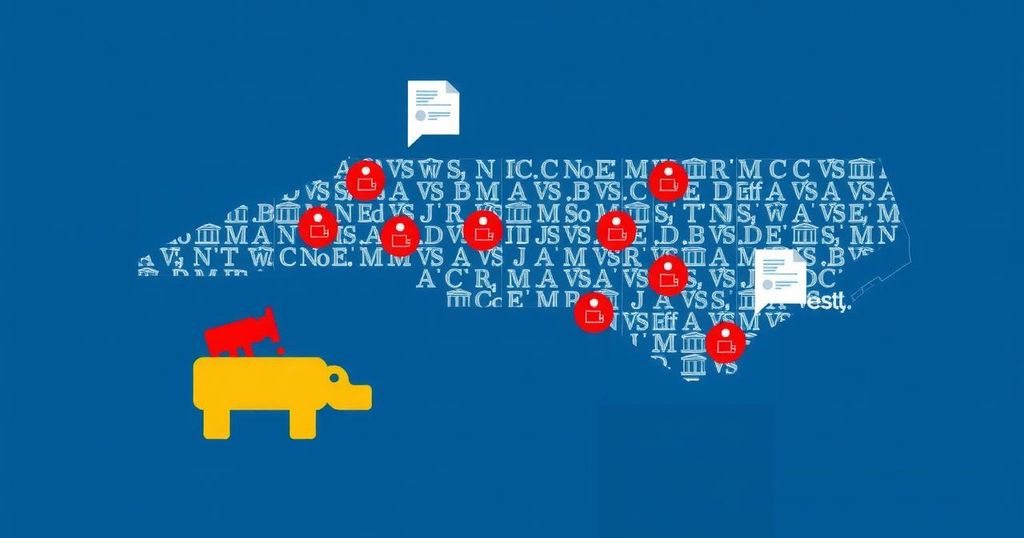World news
AFRICA, CIVIL RIGHTS, COUNCIL OF STATE, DEAN, DEANNA TOWNSEND - SMITH, DEMOCRATS, ELECTION, ELECTION INTEGRITY, GOP, GREEN, JOSH STEIN, LEGISLATION, MICHELE MORROW, MO GREEN, NC, NORTH CAROLINA, PRESIDENTIAL ELECTION 2024, PUBLIC INSTRUCTION, RACHEL HUNT, REPUBLICAN, ROY COOPER, SOUTH AFRICA, STEIN, VIRGINIA
Jamal Robinson
0 Comments
Implications of NC’s 2024 Election Results for Public Education
The 2024 elections in North Carolina have resulted in the election of Democratic leaders, including Mo Green as the new Superintendent of Public Instruction. With a broken Republican supermajority in the legislature, there are opportunities for bipartisan collaboration on public education policy. Green focuses on increasing investment in public schools, enhancing teacher support, and addressing educational equity for disadvantaged students. The ongoing political dynamics will play a crucial role in reshaping the state’s education system.
The 2024 election results in North Carolina are poised to reshape the landscape of public education within the state. With the elections leading to a divided political control and the election of key Democratic officials including Mo Green as the new superintendent of public instruction, there is potential for significant positive change. Green’s agenda focuses on increasing state investment in public schools, particularly emphasizing early learning, educator support, and addressing the needs of disadvantaged students. Furthermore, the newly elected Democratic officials will influence the State Board of Education, responsible for overseeing educational policies, while the previously held Republican supermajority in the state legislature has been fractured. This dynamic presents an opportunity for bipartisan collaboration in education policy; however, any effort is contingent on how the Republican majority chooses to engage in the legislative process going forward. Experts like Deanna Townsend-Smith express cautious optimism regarding this balance, articulating a hopeful outlook for public education amid potential collaboration between parties. Mo Green has expressed his priorities revolving around educational funding and restoring respect for educators through better support and increased salaries. He aims to create a safer school environment equipped with essential mental health services, positioning public schools as favorable educational options for families. Despite this, there remain concerns regarding whether the new political climate will indeed result in actionable changes that prioritize traditional public schools over voucher systems that favor private and charter institutions. The future direction of the State Board of Education and the extent of collaboration between the newly elected officials and the current legislature will be pivotal in determining the effectiveness of potential reforms. As political maneuvers continue, the focus remains sharply on ensuring the improvement and support of public education in North Carolina, especially for underserved communities. To summarize, the electoral results present a critical juncture for public education in North Carolina, providing both challenges and opportunities for the newly appointed leaders, educators, and legislators to enhance the quality and funding of educational infrastructure across the state.
In the context of North Carolina’s public education system, the 2024 election results signify a fundamental shift in policy direction. The election of multiple Democratic officials, including Mo Green as the new Superintendent of Public Instruction, indicates a potential move away from previously prioritizing voucher systems for private education. This change comes at a crucial time as there is a growing recognition of the need to improve funding, infrastructure, and support for traditional public schools amid wider concerns about educational equity and quality.
In conclusion, the 2024 elections in North Carolina are heralding a significant shift in the approach to public education, with new leadership poised to advocate for increased investment and support for public schools. The fracturing of the Republican supermajority may pave the way for bipartisan efforts aimed at addressing long-standing concerns regarding public education funding. With dedicated advocates like Mo Green at the helm, there is an opportunity for substantial reforms that prioritize the educational needs of all students across the state.
Original Source: www.charlotteobserver.com




Post Comment